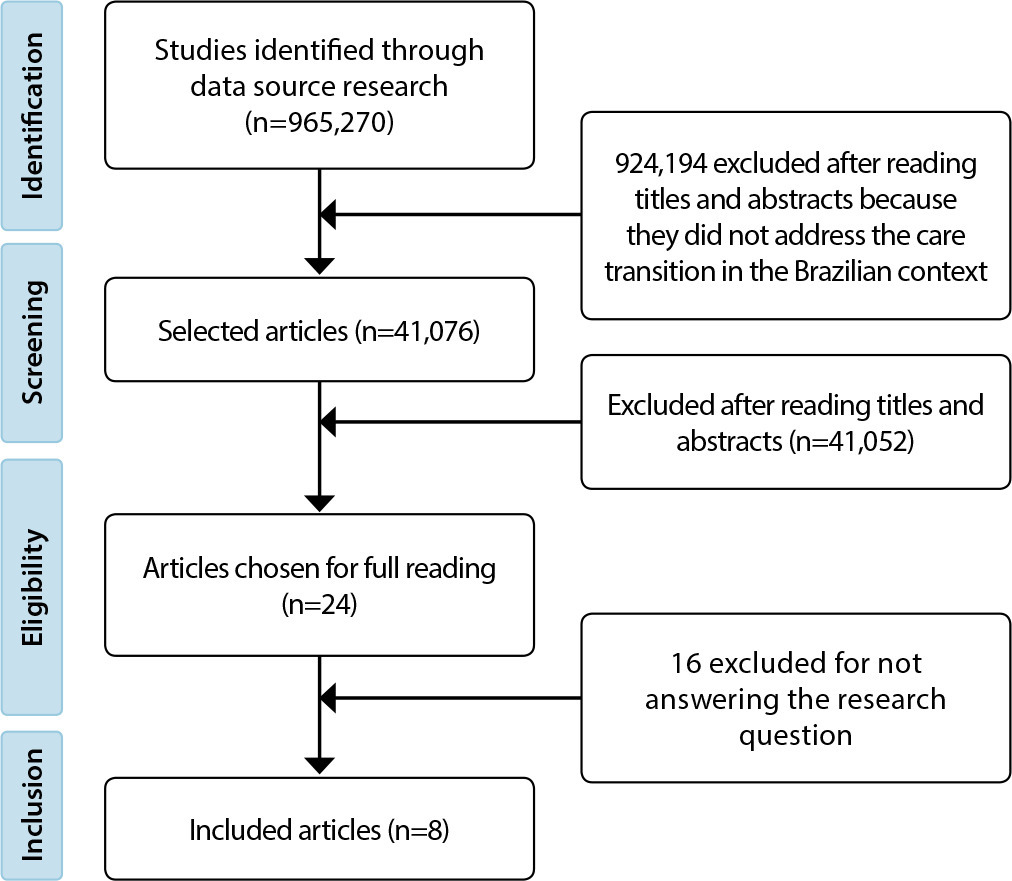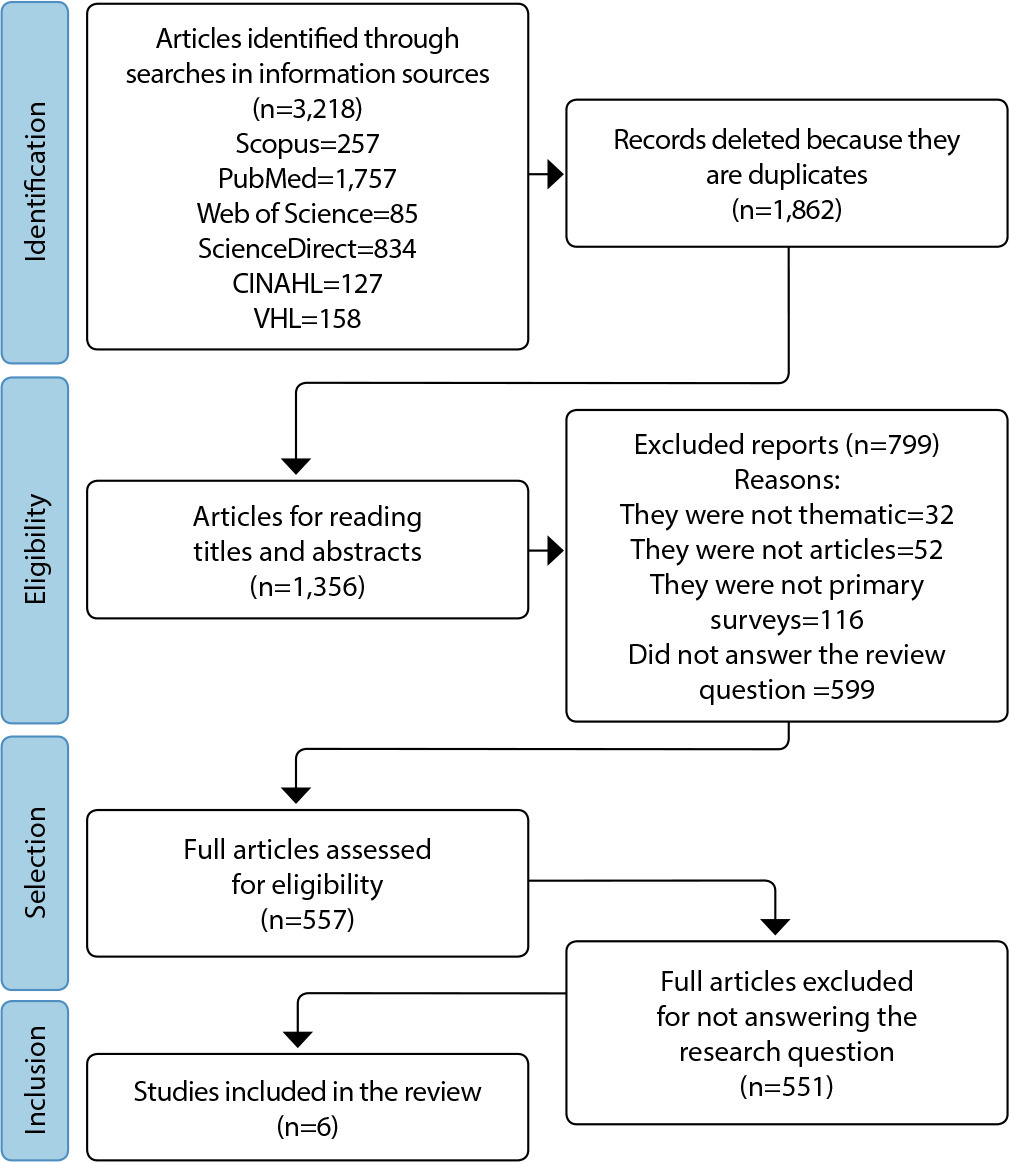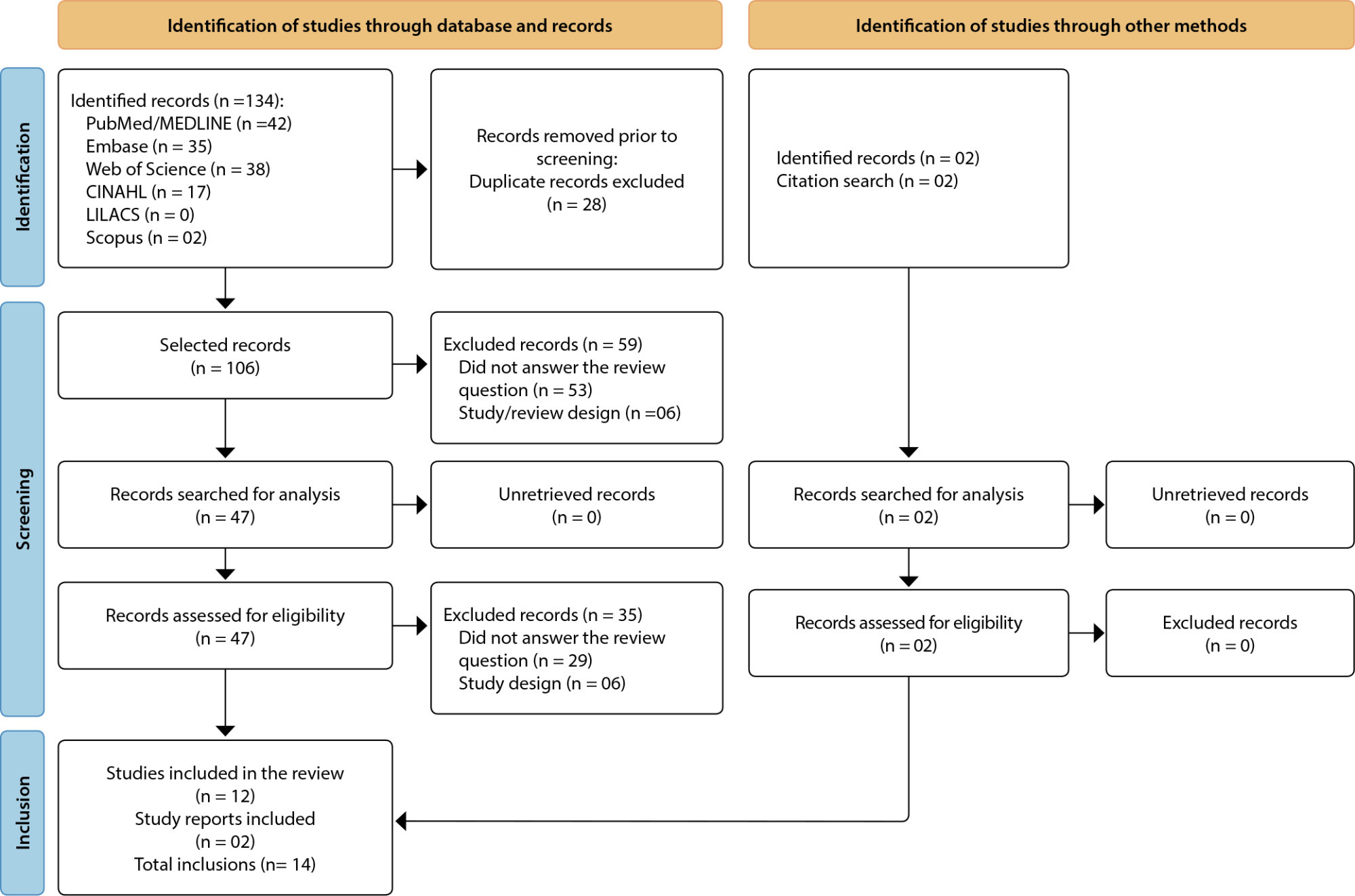-
ORIGINAL ARTICLE
Effect of cardiovascular biofeedback on nursing staff stress: a randomized controlled clinical trial
Revista Brasileira de Enfermagem. 2023;76(6):e20230069
12-04-2023
Abstract
ORIGINAL ARTICLEEffect of cardiovascular biofeedback on nursing staff stress: a randomized controlled clinical trial
Revista Brasileira de Enfermagem. 2023;76(6):e20230069
12-04-2023DOI 10.1590/0034-7167-2023-0069
Views0See moreABSTRACT
Objective:
to assess the effect of cardiovascular biofeedback on nursing staff stress when compared to an activity without self-monitoring.
Method:
a randomized controlled clinical trial, carried out with nursing professionals from a university hospital. The intervention group (n=58) performed cardiovascular biofeedback, and the control (n=57) performed an online puzzle without self-monitoring, totaling nine meetings over three weeks. The outcome was assessed using the Stress Symptoms and Work-Related Stress scales, and the biological marker heart rate variability. The generalized estimating equations method was used.
Results:
the intervention had no effect on self-reported instruments (p>0.050). However, there was an effect of time (p<0.050) on all heart rate variability indicators, demonstrating changes over the sessions.
Conclusion:
cardiovascular biofeedback showed promising results in the biological marker, suggesting that it can be used in nursing staff as a complementary therapy by promoting better autonomic nervous system regulation.

-
Transition of Care for Individuals with Mental Disorders in Brazil: A Contextual Analysis
Revista Brasileira de Enfermagem. 2023;76(6):e20230063
12-04-2023
Abstract
Transition of Care for Individuals with Mental Disorders in Brazil: A Contextual Analysis
Revista Brasileira de Enfermagem. 2023;76(6):e20230063
12-04-2023DOI 10.1590/0034-7167-2023-0063
Views0See moreABSTRACT
Objective:
To describe the contexts of care transition for individuals with mental disorders in the Brazilian setting.
Methods:
A contextual analysis was conducted through a scoping review. The search for studies was conducted in databases and thesis and dissertation portals, and the analysis was based on immediate, specific, general, and meta-contexts.
Results:
The sample, consisting of eight studies, indicated that the following factors are present in the contexts where care transition occurs: Peculiarities of care transition for individuals with mental disorders; Perspectives that can strengthen or weaken this transition; Approaches proposed in the past for the development of care transition; and Elements related to Brazilian legislation.
Final Considerations:
It is observed that the transition of care for individuals with mental disorders in Brazil takes place in various contexts of care levels. These variations present significant potentials and barriers in the care scenarios.

-
ORIGINAL ARTICLE
Sexual behavior according to undergraduate students: perspective of cross-cultural nursing and intersectional framing
Revista Brasileira de Enfermagem. 2023;76(6):e20220786
12-04-2023
Abstract
ORIGINAL ARTICLESexual behavior according to undergraduate students: perspective of cross-cultural nursing and intersectional framing
Revista Brasileira de Enfermagem. 2023;76(6):e20220786
12-04-2023DOI 10.1590/0034-7167-2022-0786
Views0ABSTRACT
Objective:
to discuss undergraduate students’ sexual behavior from the perspective of social markers and cross-cultural care proposed by Madeleine Leininger.
Methods:
descriptive-exploratory qualitative research, with a theoretical-philosophical foundation in the Transcultural Theory. Convenience sample was composed of 57 young people from two universities in Rio de Janeiro. The focus groups’ content were analyzed lexically using the IRAMUTEQ software.
Results:
four classes emerged: Young people’s sexual scripts: between the fear of an unplanned pregnancy and the risk of exposure to sexually transmitted infections; Affective relationships: trust in steady sexual partners, apparent sense of security and disuse of condoms; Sexual practices, gender and cultural determinants: distinction in men’s and women’s role; Sexual partnerships, negotiation of condom use and vulnerability to sexually transmitted infections.
Final considerations:
challenges are perceived for the attention to undergraduate students’ sexual health, who verbalized risky sexual behaviors due to sociocultural vulnerabilities.
Keywords:Cross-Cultural NursingIntersectional FramingSexual BehaviorSexually Transmitted InfectionsYoung AdultSee more
-
Sleep quality of nurses who worked in coping with COVID-19: an integrative review
Revista Brasileira de Enfermagem. 2023;76(6):e20230007
12-04-2023
Abstract
Sleep quality of nurses who worked in coping with COVID-19: an integrative review
Revista Brasileira de Enfermagem. 2023;76(6):e20230007
12-04-2023DOI 10.1590/0034-7167-2023-0007
Views0See moreABSTRACT
Objective:
to analyze sleep quality of nurses who worked coping with COVID-19 in scientific evidence.
Methods:
an integrative review, carried out in seven databases, including studies between December 2021 and June 2022, without language restrictions. The sample consisted of 15 primary studies.
Results:
nurses working in hospital, intensive care, outpatient care and teaching institutions constitute a vulnerable group for sleep disorders: latency, duration, efficiency and quality. The disorders identified involved insomnia at varying levels of severity: daytime dysfunction and morning sleepiness. Night work and low capacity for self-care were determinants of impaired sleep patterns.
Final considerations:
the COVID-19 pandemic contributed to greater vulnerability of nurses to changes in sleep, requiring strategies for risk management and well-being promotion.

-
ORIGINAL ARTICLE
Work and Mental Distress among Nurses in the Amazon Region of Brazil during the COVID-19 Pandemic
Revista Brasileira de Enfermagem. 2023;76(6):e20220792
12-04-2023
Abstract
ORIGINAL ARTICLEWork and Mental Distress among Nurses in the Amazon Region of Brazil during the COVID-19 Pandemic
Revista Brasileira de Enfermagem. 2023;76(6):e20220792
12-04-2023DOI 10.1590/0034-7167-2022-0792
Views0See moreABSTRACT
Objective:
To assess the relationship between psychopathological symptoms and the social, clinical, and occupational profile of nurses in the Amazon region of Brazil during the COVID-19 pandemic.
Methods:
A descriptive cross-sectional online study was conducted in 2020 with 261 nurses. The Symptom Assessment Scale-40 was utilized.
Results:
The presence of pre-existing conditions before the pandemic was associated with psychotism (p=0.044). Experiencing constraints and/or violence at work during the pandemic was associated with somatization (p=0.025), and working hours were associated with anxiety (p=0.025). Nurses predominantly exhibited symptoms related to fear (33.7%), tension (34.5%), and a sense that something is wrong in the mind (22.6%).
Conclusions:
A significant association was observed between working hours and anxiety symptoms, the experience of constraints and/or violence at work during the COVID-19 pandemic and somatization symptoms, as well as between pre-existing conditions and psychotism symptoms related to COVID-19.
-
Simulation training of caregivers at hospital discharge of patients with chronic diseases: an integrative review
Revista Brasileira de Enfermagem. 2023;76(6):e20230043
12-04-2023
Abstract
Simulation training of caregivers at hospital discharge of patients with chronic diseases: an integrative review
Revista Brasileira de Enfermagem. 2023;76(6):e20230043
12-04-2023DOI 10.1590/0034-7167-2023-0043
Views0See moreABSTRACT
Objective:
to identify evidence about the use and effects of clinical simulation for preparing caregivers for discharging patients with chronic conditions.
Methods:
an integrative peer review in the Scopus, PubMed, Web of Science, Cumulative Index to Nursing and Allied Health Literature, ScienceDirect and Virtual Health Library databases, from July to September 2022.
Results:
3,218 studies were identified, with a final sample consisting of four national and two international articles. Using simulation as an educational technology contributed to caregiver preparation in home care. In most studies, using clinical simulation included using other strategies to complement training: expository dialogued class, conversation circle and audiovisual resources.
Final considerations:
simulation proved to be efficient for training caregivers, with the active participation of family members and nurses in health education actions.

-
ORIGINAL ARTICLE
Feelings about birth by a group of high-risk pregnant women
Revista Brasileira de Enfermagem. 2023;76(6):e20230059
12-04-2023
Abstract
ORIGINAL ARTICLEFeelings about birth by a group of high-risk pregnant women
Revista Brasileira de Enfermagem. 2023;76(6):e20230059
12-04-2023DOI 10.1590/0034-7167-2023-0059
Views0See moreABSTRACT
Objective:
to understand feelings about birth among a group of high-risk pregnant women.
Method:
a descriptive and qualitative study, using Alfred Schütz’s social phenomenology as a philosophical theoretical framework. The study included 25 pregnant women undergoing high-risk prenatal care. The interview had the following guiding questions: tell me about your feelings regarding the moment of birth/childbirth; How do you deal with the high-risk diagnosis? What are your expectations for birth/childbirth?
Results:
five categories emerged: Fear of obstetric care; Fear of complications with the baby; Fear of cesarean section; Resilience in the face of high-risk pregnancy; and Expectations for birth.
Considerations:
high-risk pregnant women are afraid of the care they will receive, the risks and concern about the baby’s vitality at birth. The importance of care is emphasized, with a welcoming environment, bonding and communication between health team and pregnant woman.
-
ORIGINAL ARTICLE
Burnout assessment in nurses from a general emergency service
Revista Brasileira de Enfermagem. 2019;72(6):1457-1463
10-21-2019
Abstract
ORIGINAL ARTICLEBurnout assessment in nurses from a general emergency service
Revista Brasileira de Enfermagem. 2019;72(6):1457-1463
10-21-2019DOI 10.1590/0034-7167-2017-0870
Views0See moreABSTRACT
Objective:
To assess the level of Burnout among nurses in a general emergency department.
Method:
Quantitative, descriptive, correlational and cross-sectional study. 32 nurses from a general adult emergency department answered a questionnaire to evaluate Burnout. (Copenhagen Burnout Inventory).
Result:
It was verified that 59.4% of the nurses presented total Burnout. Work-related burnout was the subscale with the highest average score. It was found that the lower the age and the longer the time working in the institution, the higher the level of Burnout. Longer professional experience was related to lower levels of Burnout. There were also higher scores of Burnout among participants who thought about changing their profession, their institution or their service.
Conclusion:
The prevalence of Burnout is high. Professional Burnout was the most critical subscale. Age and the current work are the subscales that most influence perceived Burnout
-
REFLECTION
The nurse’s work in the context of COVID-19 pandemic
Revista Brasileira de Enfermagem. 2021;74:e20200594
03-05-2021
Abstract
REFLECTIONThe nurse’s work in the context of COVID-19 pandemic
Revista Brasileira de Enfermagem. 2021;74:e20200594
03-05-2021DOI 10.1590/0034-7167-2020-0594
Views0See moreABSTRACT
Objective:
Reflect on the work experienced by the nurse in coping with the COVID-19 pandemic in a public hospital of the State of Rio Grande do Norte.
Methods:
Reflective essay based in the professional experience in a public reference hospital for the care of patients affected by COVID-19 in the State of Rio Grande do Norte. Results were organized in two empirical categories, which emphasize potentialities and barriers in the nurse’s work in the face of the COVID-19, presented by means of Ishikawa diagram.
Results:
Two categories emerged from the experiences: Nursing leadership in organizing health services to face COVID-19; and the performance of nursing care management in the COVID-19 pandemic.
Final considerations:
It is necessary to value the nurse’s work in all its attributes, as well as strengthen the interdisciplinary work processes, which collaborate to overcome the crisis caused by the pandemic.

-
ORIGINAL ARTICLE
Nursing appeals on social media in times of coronavirus
Revista Brasileira de Enfermagem. 2020;73:e20200225
07-10-2020
Abstract
ORIGINAL ARTICLENursing appeals on social media in times of coronavirus
Revista Brasileira de Enfermagem. 2020;73:e20200225
07-10-2020DOI 10.1590/0034-7167-2020-0225
Views0See moreABSTRACT
Objective:
to know and analyze the nursing appeals on social media during the COVID-19 pandemic.
Method:
it is a documentary, qualitative, descriptive, and exploratory research with data collected in publications in two social media. Two hundred ninety-five publications of nursing professionals published on Twitter and Instagram between March 11 and 20, 2020 were submitted to content analysis using ATLAS.ti resources.
Results:
four thematic categories emerged: #stayathome, #whereismyPPE, #nowweareheroes, #nothingnewinthefrontline, according to frequency of communications. The appeals show a relationship with the social relevance of nursing professional work and with the conditions required for its exercise.
Final considerations:
old and new challenges of the profession were placed on the agenda in social media, especially related to the workforce and instruments of labor. These speeches can serve as a foundation for policies to improve working conditions and promote appreciation of the profession.

-
ORIGINAL ARTICLE
Stress of nursing professionals working in pre-hospital care
Revista Brasileira de Enfermagem. 2020;73(2):e20180660
06-09-2020
Abstract
ORIGINAL ARTICLEStress of nursing professionals working in pre-hospital care
Revista Brasileira de Enfermagem. 2020;73(2):e20180660
06-09-2020DOI 10.1590/0034-7167-2018-0660
Views0ABSTRACT
Objectives:
To analyze the factors related to the occupational stress of a Mobile Emergency Care Service (Samu) nursing team.
Methods:
This is a descriptive study, with a quantitative approach, performed with nursing professionals from Samu service of a city of Pernambuco. A sociodemographic questionnaire and the Lipp’s Stress Symptom Inventory were used.
Results:
The participants presenting stress (24.6%) were classified in the phases: resistance (19.7%), exhaustion (4.4%) and near exhaustion (0.5%). It was also observed an association of stress level with the following factors: gender, sleep quality, professional autonomy restriction, emotional exhaustion with work performed and work in inadequate or unhealthy physical facilities.
Conclusions:
Although showing low occurrence of stress, this study pointed out the profile that presents the highest risk of developing occupational stress, through the factors significantly associated with stress in the studied population.
Keywords:Burnout ProfessionalEmergenciesNurse Practitioners: Emergency Medical ServicesOccupational StressSee more -
ORIGINAL ARTICLE
Mobile application for the teaching of the International Classification for Nursing Practice
Revista Brasileira de Enfermagem. 2019;72(4):1020-1027
08-19-2019
Abstract
ORIGINAL ARTICLEMobile application for the teaching of the International Classification for Nursing Practice
Revista Brasileira de Enfermagem. 2019;72(4):1020-1027
08-19-2019DOI 10.1590/0034-7167-2018-0751
Views0ABSTRACT
Objective:
Developing a mobile application for the teaching of the International Classification for Nursing Practice.
Methods:
Methodological applied research for technological production, performed in three phases of the contextualized instructional design model: analysis, design and development.
Results:
The application has an initial screen, which provides information about the team and its purpose. Then, four moblets are listed, including presentation, user’s guide consisting of five modules, educational games and five clinical cases. The references on which the application was based are also presented.
Final considerations:
It was possible to develop an application with the potential to promote the knowledge of nursing students and professionals about this classification system.
Keywords:Educational TechnologyNursingNursing InformaticsNursing ProcessStandardized Nursing TerminologySee more
-
REFLECTION
Children’s (in)visibility in social vulnerability and the impact of the novel coronavirus (COVID-19)
Revista Brasileira de Enfermagem. 2020;73:e20200302
06-29-2020
Abstract
REFLECTIONChildren’s (in)visibility in social vulnerability and the impact of the novel coronavirus (COVID-19)
Revista Brasileira de Enfermagem. 2020;73:e20200302
06-29-2020DOI 10.1590/0034-7167-2020-0302
Views0ABSTRACT
Objective:
To examine the impact of the infection by the novel coronavirus on Brazilian children in situation of social vulnerability based on the Millennium Sustainable Development Goals.
Method:
Reflective study based on discursive formulation in three aspects: principles of the objectives and goals for the millennium sustainable development; impact of the pandemic on the health of children and their families living in social vulnerability; and the role of pediatric nursing in the care provided – limits and challenges.
Results:
In January 2020, the news of COVID 19 is released as a pandemic. In Brazil, children and families are still without access to basic rights, thereby increasing their risks of social vulnerability because of the quarantine. The nursing field has an important role in monitoring children and their families, offering guidance in search for solutions and preventing contamination.
Conclusion:
There are still challenges to be overcome by the children and their families in situations of vulnerability against COVID-19.
Keywords:ChildrenCoronavirus InfectionsPediatric NursingSustainable DevelopmentVulnerable PopulationSee more -
ORIGINAL ARTICLE
Effects of floral therapy on labor and birth: a randomized clinical trial
Revista Brasileira de Enfermagem. 2021;74:e20210079
08-18-2021
Abstract
ORIGINAL ARTICLEEffects of floral therapy on labor and birth: a randomized clinical trial
Revista Brasileira de Enfermagem. 2021;74:e20210079
08-18-2021DOI 10.1590/0034-7167-2021-0079
Views0INTRODUCTIONThe Policy of Comprehensive Attention to Women’s Health focuses on improving obstetric care. One of the points observed in the Program of Comprehensive Attention to Women’s Health is the monitoring of pacts to reduce the rate of cesarean sections in hospitals of the Brazilian Unified Health System (SUS – Sistema Único de Saúde), rescuing the […]See more
-
ORIGINAL ARTICLE
Health literacy of adults with and without arterial hypertension
Revista Brasileira de Enfermagem. 2019;72(3):646-653
06-27-2019
Abstract
ORIGINAL ARTICLEHealth literacy of adults with and without arterial hypertension
Revista Brasileira de Enfermagem. 2019;72(3):646-653
06-27-2019DOI 10.1590/0034-7167-2018-0366
Views0See moreABSTRACT
Objective:
Assess the level of health literacy of adults, with and without hypertension, treated in three basic health units (UBS) in Picos, Piauí.
Methods:
Cross-sectional study conducted with 357 adults. Data were collected using a questionnaire with sociodemographic variables, and literacy was assessed by the Test of Functional Literacy in Adults. Descriptive analysis was performed followed by the association between literacy and exposure variables with Pearson’s chi-squared (X2) test and Mann-Whitney U test.
Results:
Inadequate or marginal health literacy was found in three units investigated (71.5%; 77.8% and 85.2%);. Age and the years of schooling were factors associated with inadequate literacy in adults with hypertension (p<0.0001).
Conclusion:
Inadequate literacy was found in more than 70% of the hypertensive patients investigated. This finding reinforces the need to improve the self-care skills of hypertensive patients, especially the older ones and those with few years of schooling.
Search
Search in:
Nuvem de Tags
Aged (144) Atenção Primária à Saúde (239) COVID-19 (104) Cuidados de Enfermagem (269) Educação em Enfermagem (151) Educação em Saúde (139) Enfermagem (930) Estudos de Validação (131) Health Education (144) Idoso (208) Mental Health (149) Nursing (987) Nursing Care (306) Patient Safety (151) Primary Health Care (284) Qualidade de Vida (104) Quality of Life (106) Saúde Mental (145) Segurança do Paciente (150) Validation Studies (108)




